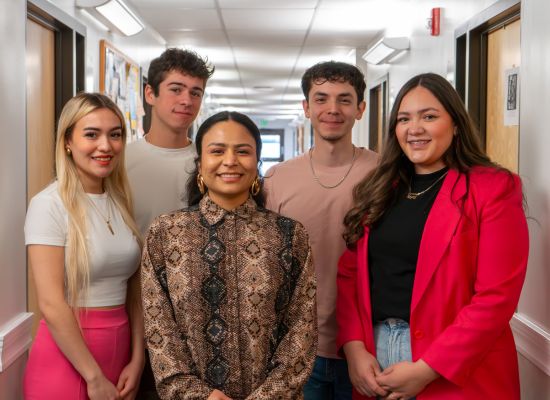International trade competition showcases Regis students and HSI status
Exporting dairy products from the United States to a trade partner overseas comes with a litany of logistics: What is the best way to handle refrigeration? How can an American company best market its goods to overseas consumers? How can the company increase profit while decreasing costs?
Those are the challenges a group of Regis students are tackling this semester as they get a first-hand look at the world of international trade in a competition sponsored by the U.S. Department of Agriculture. Five students — Sayuri Toribio, Christian Muñoz, Keiry Sosa, Danny Gonzales-Hyde, and Lupita Villegas — are representing Regis as they compete against 19 other minority-serving institutions in the Agricultural Export Market Challenge.
As part of the Feb. 27 competition, the students will present virtually for ten minutes to a panel of experts in Washington, D.C. Their project is based on a scenario that puts them in charge of Dreamy Dairy, an imaginary dairy company seeking to export its products to South Korea. If they win, the team will have the opportunity to travel to Washington, D.C., to meet with experts in foreign trade.
On a national level, the competition is sponsored by the Hispanic Association of Colleges and Universities (HACU) and the USDA’s Foreign Agricultural Service. The Regis portion of the competition, sponsored by the Office of Diversity, Equity and Inclusive Excellence and Anderson College of Business and Computing, is led by alumna Jennifer Jahnke, who has a background in international trade and human rights.
“I'm happy to have the opportunity to hopefully mentor these guys, not only in this challenge, but beyond when they go to the workforce,” she said. “I would love to stay in contact with all of them. They're rock stars … I like to give professional advice because I benefited from that.”
As the students compete in the competition, they’re taking on challenges in the areas of diplomacy, economics, marketing and trade policy. The students, who each have different majors, said the different skills they bring to the table give them an advantage.
Sosa, a politics and peace and justice double major, is researching South Korea’s macroeconomics, a task that fits in with her previous coursework.
“The way that my major has really fallen into place with this is I took a class in international relations, and it's really helped me kind of understand the relationships between the U.S. and foreign countries,” she said. “And it's helped me formulate ideas as to how we can use trade agreements to better serve what we want, so to decrease the amount of cost but increase the amount of profit.”
Gonzales-Hyde, a politics and communications major, said the competition highlights each member’s skillset.
“It's shown in the variety of disciplines that we have, the strengths of our team,” he said. “I think that that is something that's been huge so far that we all have different specialties and we're all coming to the same table and we're really challenging each other, and teaching each other, and learning from one another.”
Toribio, a business administration major, said despite their different areas of study, the students find that working toward a common goal makes their contributions come together seamlessly.
“We all have shared interests and passions,” she said. “This is really cool that we get to work on a project together, where we're all in different majors, but it's our shared passion … our passion for education and commitment to something bigger than ourselves is really cool.”
Like Regis, each of the universities taking part in the challenge serve a significant number of minority students. For nearly one year, Regis has been designated as a Hispanic-Serving Institution, a distinction that means at least 25 percent of the undergraduate student population is Hispanic.
Muñoz, a politics major, said the competition aligns with the University’s HSI status.
“As a group of Hispanic students, this is a big part of what HSI means for Regis University in elevating our voices on campus and across in the country because we are competing against other universities with some of their designations including HSI and Historically Black Colleges and Universities,” he said. “And so, (we’re) just making sure that that designation isn't just a title that we have on our website, or whatever it might be, but that we're using that title to create opportunities for students here on campus and make it mean something.”
